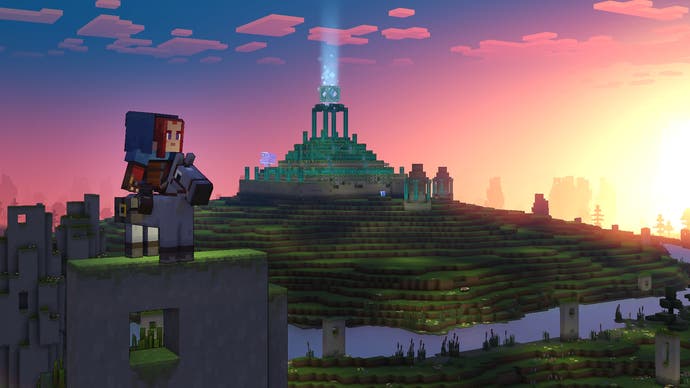Minecraft Legends is an interesting prospect. Like Minecraft Dungeons, it takes the familiar iconography and building blocks of one of gaming’s most familiar and beloved worlds, and employs everything in a new way. For Dungeons, this meant transforming the game into a hack-and-slash action RPG. For Legends, it means something the developer’s calling “action strategy”, but might otherwise be called real-time strategy.
Ian and I had a chance to play the game in London a few weeks ago, dropping into the start of the single-player campaign and then trying a 3vs3 multiplayer match. (The final game will support 4vs4 and 2vs2 as well, I gather.) With the game out on the 18th, it’s not too long before you’ll get to see all this yourself, but here, at least, are the very basics.
I was surprised by what a traditional RTS Legends actually feels like, albeit one that’s been smartly stripped back for an audience that is coming to this genre perhaps for the first time. Story-wise, Piglins are invading the worlds of Minecraft, and these funny, grotty, ravenous little horrors might be my favourite element of the entire game, spreading a charmingly silly kind of anarchy wherever they go. As a hero character you can attack them with your sword as you move around the procedurally created maps on your horse, but since this is a strategy game, the real key to success comes from harvesting resources and then building stuff with it.
Harvesting resources is done indirectly, by using Allays, little buzzy people, who will go where directed and gather wood and stone and whatnot. Once you’ve got all this you can build a wide range of things, from defensive structures and walls to spawners for mobs – all of which will be familiar from Minecraft itself – which you can then take into battle with you.
In single-player, after a quick tutorial, I spent most of my time in a fairly large map, capturing small settlements, upgrading their defenses and then heading out to capture more settlements, giving Piglins a kicking and slowly controlling more of the map.
It’s simple but quite compulsive, and there are some interesting decisions that I really liked. The maps are pretty roomy, for example, with lots of wilderness spaces in between objectives. Not only is this the kind of terrain that Minecraft turns out so beautifully, it also means that this is an RTS with a nice element of horizon-lust. I wandered about, admired the new gentle Cel-shading, wondering what I might find.
The big maps are retained for multiplayer too, which pitted two teams of three players against each other with the ultimate objective of smashing up the enemy’s castle. Very quickly, it became clear that with the map’s wide open spaces, dividing the team sensibly was crucial to victory. Once the base defences were coming together, one of us should head out and start harvesting resources, another should keep an eye on the enemy, and a third should stay back home building more aggressive structures, starting with arrow towers and ending with things that are a lot more explosive, and better spawners.
It’s a bit of a rush to head into battle with a bunch of Creepers bobbling behind me, and there seems to be a touch of elegance to the controls, which offers players very quick and simple ways to select massive amounts of nearby troops and direct them around, while deeper options allow more sophisticated slicing and dicing of troop types and objectives.

This is a very high-level overview of Minecraft Legends, I know, but in truth the specifics – unit types, building options – did not make as much of an impression on me as the basic fact that Minecraft actually suits the RTS template surprisingly well. This is a well-established world by now, and the team has done a great job, I think, of making sure the elements that you recognise from the original Minecraft make sense when you pick them up again here. Of course Allays will slowly deconstruct mountains for you, harvesting stone or coal. Of course Creepers will be jerks on the battlefield.
And there’s that touch of wildness, too, which seems to be so central to Minecraft itself. Even on a 3vs3 multiplayer match there were still various camps of Piglins in play, granting Prismarine, a special resource that is needed for building up useful stuff the home base. The world is filled with distractions, possible dangers, and the chance for something unexpected to happen. Why? Because ultimately it’s still Minecraft.
